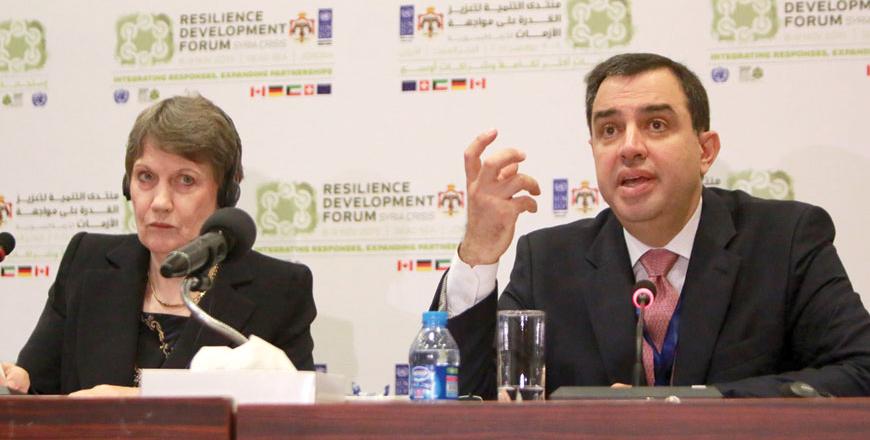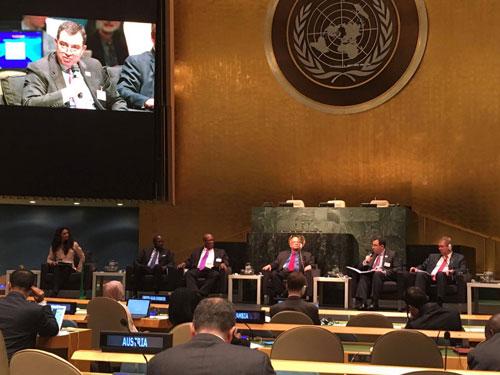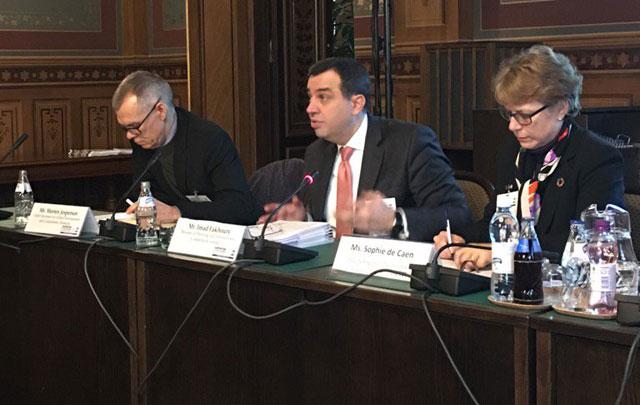You are here
Fakhoury highlights shortfalls in int’l support for Syrian refugee crisis
By Omar Obeidat - Nov 10,2015 - Last updated at Nov 10,2015

Minister of Planning and International Cooperation Imad Fakhoury and UNDP Administrator Helen Clark hold a joint press conference at the Dead Sea on Monday (Photo courtesy of Planning and International Cooperation Ministry)
DEAD SEA – Planning and International Cooperation Minister Imad Fakhoury on Monday described as "disgraceful" the volume of support to Jordan as "it has been shouldering the burdens of the Syrian refugee crisis on behalf of the region and world".
At a press conference on the sidelines of the Resilience Development Forum, organised by the UNDP at the Dead Sea, Fakhoury said it is time for the international community to respond in a better way to the Kingdom's financing needs to continue offering services to hundreds of thousands of Syrian refugees, noting that Jordan was the first country in the region to prepare a response plan for the Syrian crisis.
The direct and indirect cost of the Syrian crisis on the Kingdom's treasury and economy so far reached $6.6 billion, according to the minister.
At the joint press conference with UNDP Administrator Helen Clark, the minister pointed out that pledges by donors for the 2015 Jordan response plan cover only 36 per cent of the required funding that was estimated at $2.9 billion, while funding for host communities across the Kingdom covered only 8 per cent.
“It is a shame and we cannot accept this. Funding should be complete or at least enough to enable us cope with the refugee burden,” he added.
Fakhoury said funding required for the 2016-2018 response plan was estimated at $8 billion —$2.5 billion for humanitarian needs, $2.5 billion in financial support to host communities and $3 billion to compensate the Treasury for the burdens it is going to bear.
However, there are signals from the international community to increase support for the Jordanian response plan, the minister noted.
“But the challenge remains as to what degree this support is going to be. Is it going to be enough to cover the burdens Jordan is handling?”
“We are entering the fifth year of the Syrian crisis with Jordan continuing to deal with the repercussions of the crisis and other regional developments that have [taken] their toll because the country insists on keeping its borders open to receive Arabs from all directions,” he told reporters, adding that the Kingdom is the most hit by the Syrian crisis when it comes to the population as Syrians currently represent 20 per cent of population.
Authorities estimate the number of Syrians in Jordan at around 1.5 million.
When comparing Jordan with countries that share borders with Syria, it has the lowest national income, he added, noting that the Kingdom is the world’s number one in terms of hosting refugees in the past 70 years.
Fakhoury called on the international community to offer more financial support to host countries before urging them to create jobs for refugees.
“They have first to help host countries in responding to their plans and then they can launch initiatives for creating economic opportunities for refugees,” he said, noting that all donor countries are demanding creating economic opportunities for Syrians.
“Our stance in Jordan is clear and won’t change. This is a sovereign right for Jordan and we will not give up this right. Dealing with the refugee crisis should be according to a holistic manner,” he said, stressing that creating economic opportunities for refugees should not be at the expense of the host communities and citizens, and the development gains the Kingdom has achieved.
“Jordan has exerted a lot of efforts and spent money to achieve such development goals and we don’t want to see these gains hit because of a refugee burden we continue to bear.”
He noted that Jordan’s response plans were prepared in full coordination with all donors, UN agencies and international NGOs.
Clark echoed Fakhoury’s remarks by urging the international community to mobilise more assistance for Jordan and other host countries to be able to cope with the Syrian refugee crisis.
Related Articles
AMMAN — Planning and International Cooperation Minister Imad Fakhoury on Sunday called on the UN and other organisations to report their ref
AMMAN — The UN Development Programme (UNDP) has nominated Planning and International Cooperation Minister Imad Fakhoury to be a member of "a
AMMAN — Planning and International Cooperation Minister Imad Fakhoury has participated in an international conference in Helsinki to discuss














